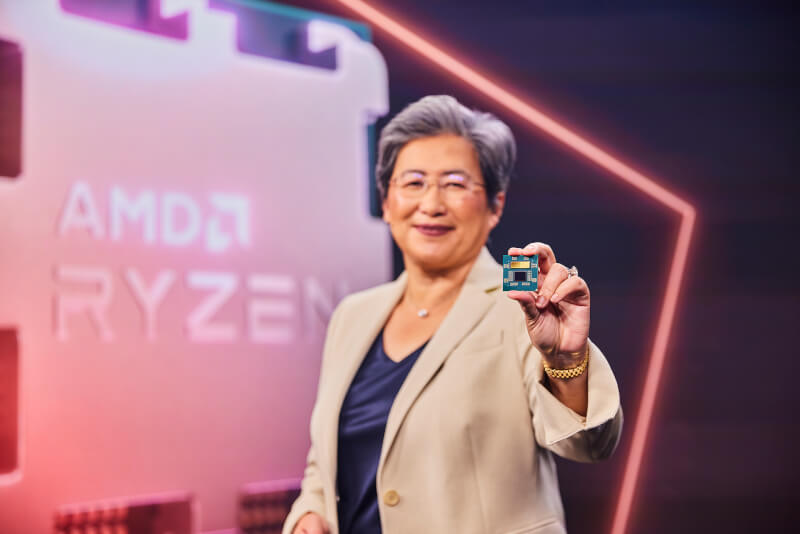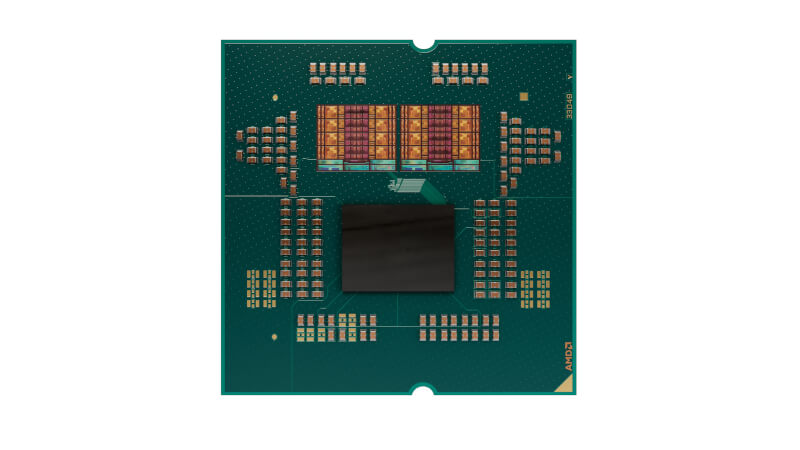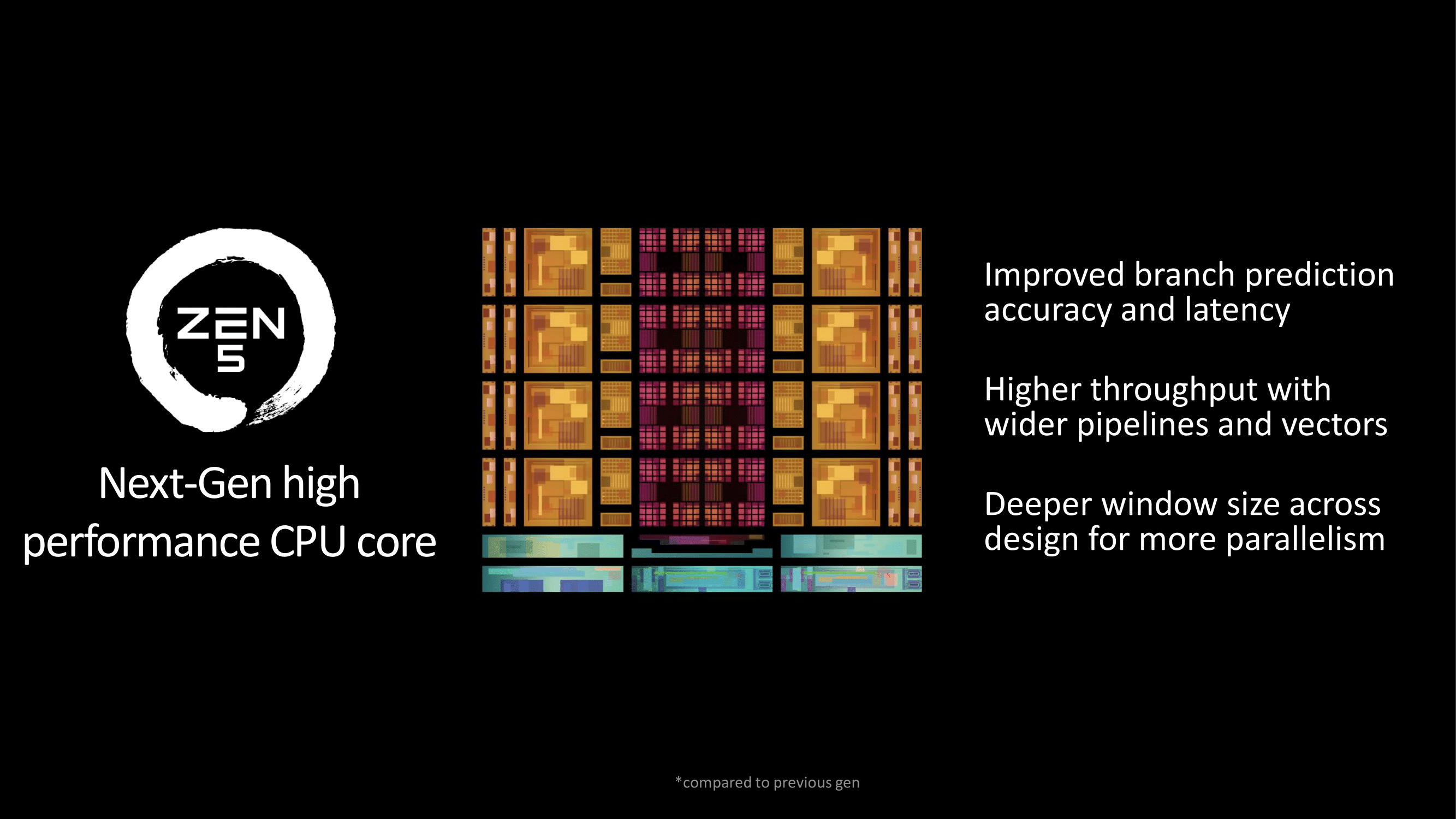AMD unveils Ryzen 9000 CPUs
_678x452.jpg)
During AMD's Computex 2024 kick-off keynote, AMD's CEO, Dr. Lisa Su, officially the company's next generation Ryzen processors. It was the first presentation of AMD's much-anticipated Zen 5 microarchitecture via the Ryzen 9000 series, which will bring several advancements over Zen 4 and the Ryzen 7000 series to desktop PCs, which will launch sometime in July 2024.

AMD has unveiled four new chip SKUs that use its Zen 5 microarchitecture. The AMD Ryzen 9 9950X processor will be the new top model on the consumer side, with 16 CPU cores and a fast maximum boost frequency of 5.7 GHz. The other new CPUs include 6, 8 and 12 cores, giving users a varied combination of core and thread counts. All four of these chips will be X-series chips, meaning they have an unlocked multiplier and higher TDPs/clock frequencies.
.png)
In terms of performance, AMD claims an average IPC increase in desktop workloads for Zen 5 of 16%. With the new desktop Ryzen chips' clock speeds remaining largely identical to their Ryzen 7000 predecessors, this should translate to similar performance expectations for the new chips.
The AMD Ryzen 9000 series will also launch on the AM5 socket, which debuted with AMD's Ryzen 7000 series and marks AMD's commitment to socket/platform longevity. Along with the Ryzen 9000 series comes a pair of new high-performance chipsets: the X870E (Extreme) and the regular X870 chipset. We did not get the full insight into which functions will be part of the chipset yet. However, we do know that USB 4.0 ports are standard on the X870E/X870 boards, along with PCIe 5.0 for both PCIe graphics and NVMe storage, with higher AMD EXPO memory profile support expected than previous generations.
In terms of architectural differences between the last few generations (Zen 4 and Zen 3) and Zen 5, we know that AMD is using a new manufacturing process for its Ryzen 9000 desktop chips. While many have claimed and speculated that Zen 5 for desktops will be built on one of TSMC's N3 (3nm) nodes, however, it appears that the Zen 5 CCD will be manufactured on TSMC N4.

While AMD didn't provide an in-depth overview of the Zen 5 architecture at Computex, the company mentioned some of the major architectural improvements over Zen 4 that come with the new CPU architecture. These start with an improved branch predictor, which is designed to offer better accuracy, efficiency and reduced overall latency for instruction cycles. The Zen 5 architecture also has higher throughput with wider pipelines and SIMDs, enabling faster data processing and resulting in better overall performance in benchmarks such as CineBench and Blender and workloads that utilize the AVX-512 instruction set.
.png)
Collectively, these improvements aim to deliver significant performance improvements over the previous Zen 4 microarchitecture, with AMD claiming an average 16% IPC performance increase over Zen 4 in desktop workloads.
AMD's Ryzen 9000 chips will also have similar memory support to their predecessors, with AMD sticking with DDR5. However, AMD notes that the upcoming X870E and X870 motherboard chipsets will allow faster EXPO memory profiles than seen on Zen 4.
The announcement of Zen 5 for desktop by AMD and the upcoming Ryzen 9000 offer four X-series SKUs at launch that allow overclocking and come with unlocked CPU multipliers. The flagship SKU, the Ryzen 9 9950X, has 16 cores, a maximum boost clock of up to 5.7 GHz, 80 MB of cache divided between 64 MB for L3 and 16 MB for L2 (1 MB per core of L2) and a 170 W TDP. The Ryzen 9 9900X offers 12 cores, a maximum boost clock of up to 5.6 GHz, 64 MB L3 cache and a 120 W TDP.

Further down the Ryzen 9000 stack is the Ryzen 7 9700X, which comes with 8 cores, a maximum boost clock of up to 5.5 GHz, 32 MB L3 cache and a 65W TDP. Finally, the entry-level SKU, the Ryzen 5 9600X, has only 6 cores, a maximum boost clock of up to 5.4 GHz, 32 MB L3 cache and a 65 W TDP.
The next slide lists the flagship Zen 5. Ryzen 9 9950X is up against Intel's current 14th Gen Core i9-14900K. In productivity and content creation tasks, the Ryzen 9 9950X shows a 7% improvement in Procyon Office, a 10% increase in Puget Photoshop, and a 21% increase in Cinebench R24 nT. More notably, it shows a 55% performance increase in Handbrake and a 56% increase in Blender.
.png)
Interestingly, gaming data shows marginal gains in some titles, although it highlights more significant improvements in others. AMD's internal tests show that the Ryzen 9 9950X outperforms the Intel Core i9-14900K by 4% in Borderlands 3, 6% in Hitman 3 and 13% in Cyberpunk 2077. Furthermore, it achieves a 16% improvement in F1 2023, a 17% gain in DOTA 2 and a 23% increase in Horizon Zero Dawn.
As mentioned, AMD is committed to extending its AM5 socket for life, much more than other vendors offer with their CPU launches and updates. As such, AMD's Ryzen 9000 series operates on the current AM5 platform. And while the Ryzen 9000 is fully backwards compatible with existing 600-series boards, AMD has also prepared two new 800-series motherboard chipsets for the launch of Zen 5 on desktops. The X870E (extreme) and X870 chipsets will be featured on several new motherboards at launch, and a big part of Computex this week will be the motherboard vendors (most of them local Taiwanese firms) showing off their new products.
.jpg)
AMD has offered few details about their X870E and X870 chipsets. Of particular note is that USB 4.0 support will be standard on all X870(E) motherboards, where it was optional on the X670(E) series boards. X870(E) boards will also have Wi-Fi 7 support (up from 6E on the 600 series), and at least one PCIe 5.0 NVMe slot continues to be mandatory. AMD also notes that motherboards based on both platforms "have 44 total PCIe lanes," which would break down to 24 lanes from the CPU and another 20 lanes from the chipset.
AMD has confirmed that the new chipsets are not based on new silicon. Instead, the company uses the same ASMedia-produced design as in the X670/B650 chipsets: the Promontory 21 controller. Since the feature sets of the newer X870E/X870 motherboards are fundamentally the same as those of the X670E/X670 motherboards, apart from the use of newer external controllers such as Wi-Fi 7, there appears to be little need to change the chipset itself.
AMD's Ryzen 9000 series, including the flagship Ryzen 9 9950X (16C/32T), Ryzen 9 9900X (12C/24T), Ryzen 7 9700X (8C/16T) and entry-level Ryzen 5 9600X (6C/12T) are expected to hit retail channels sometime in July 2024. At the time of writing, AMD is not offering pricing.
Latest processor - cpu
-
31 Octprocessor - cpu
-
16 Sepprocessor - cpu
AMD Ryzen AI 7 PRO 360 spotted
-
04 Sepprocessor - cpu
Intel scores big AI chip customer
-
04 Sepprocessor - cpu
Exclusively-Intel manufacturing store drawers
-
29 Augprocessor - cpu
Big performance boost for Ryzen CPUs
-
28 Augprocessor - cpu
Intel shares could fall in battle with TSMC and NV
-
28 Augprocessor - cpu
AMD is claimed to have been hacked
-
27 Augprocessor - cpu
Intel presents Lunar Lake, Xeon 6, Guadi 3 chips
Most read processor - cpu
Latest processor - cpu
-
31 Octprocessor - cpu
AMD will launch the Ryzen 7 9800X3D on November 7
-
16 Sepprocessor - cpu
AMD Ryzen AI 7 PRO 360 spotted
-
04 Sepprocessor - cpu
Intel scores big AI chip customer
-
04 Sepprocessor - cpu
Exclusively-Intel manufacturing store drawers
-
29 Augprocessor - cpu
Big performance boost for Ryzen CPUs
-
28 Augprocessor - cpu
Intel shares could fall in battle with TSMC and NV
-
28 Augprocessor - cpu
AMD is claimed to have been hacked
-
27 Augprocessor - cpu
Intel presents Lunar Lake, Xeon 6, Guadi 3 chips






